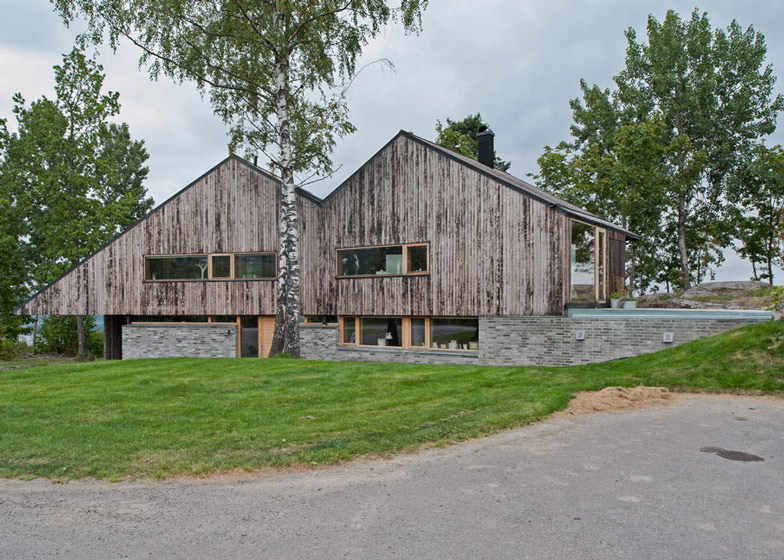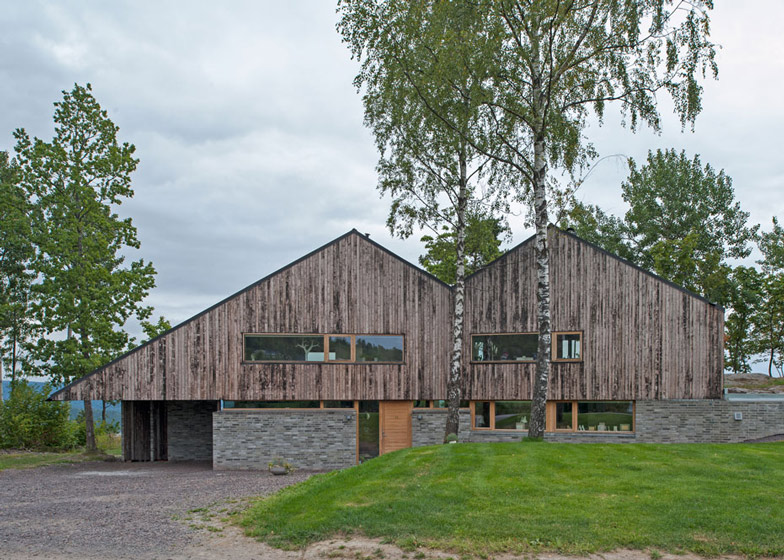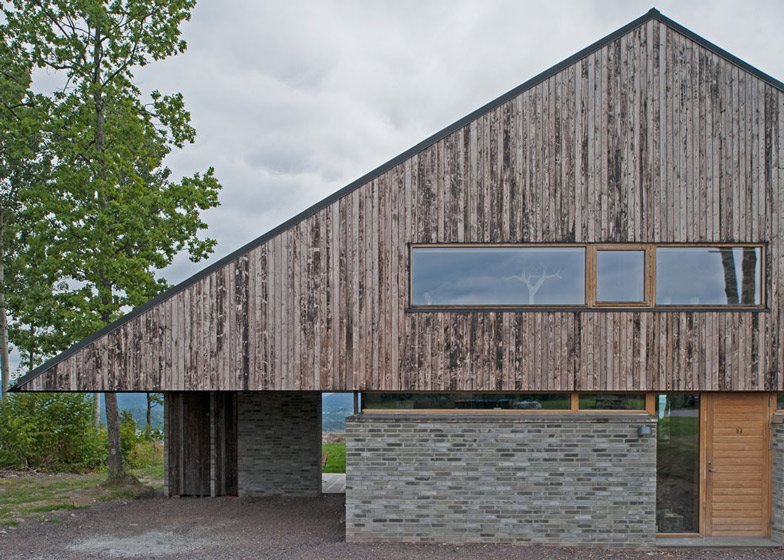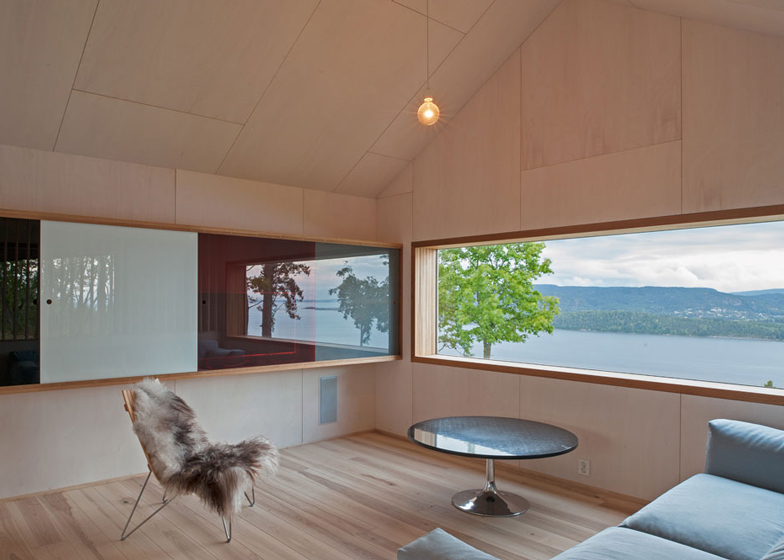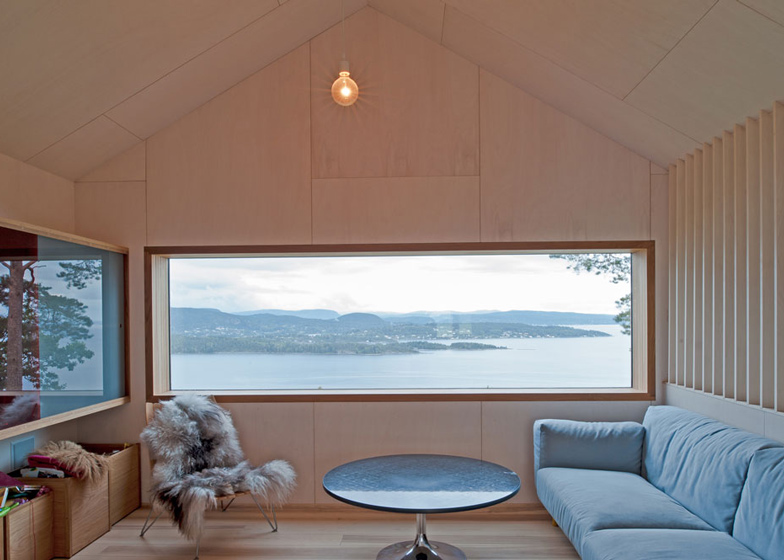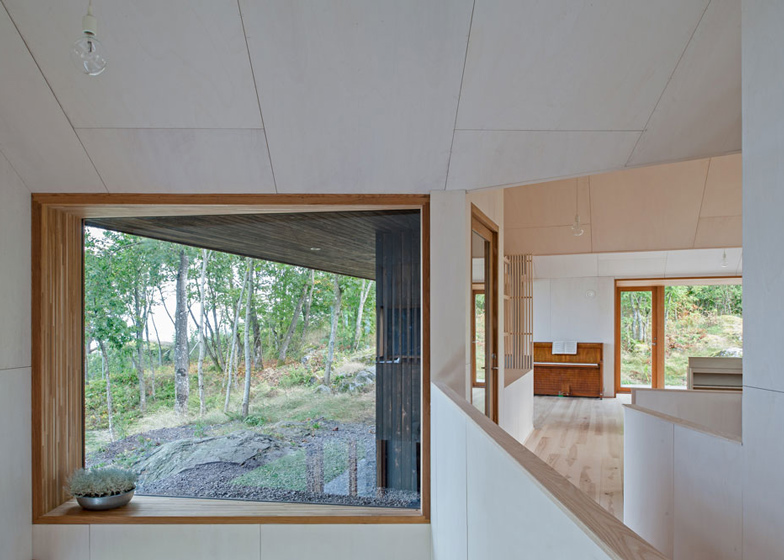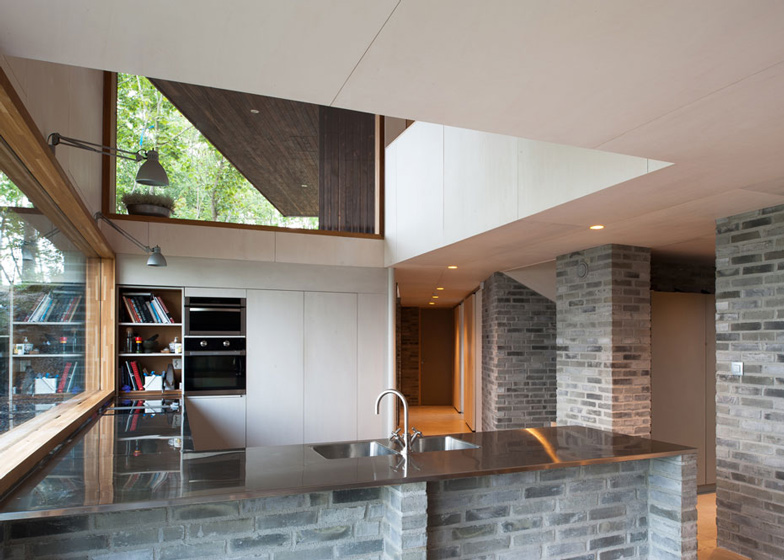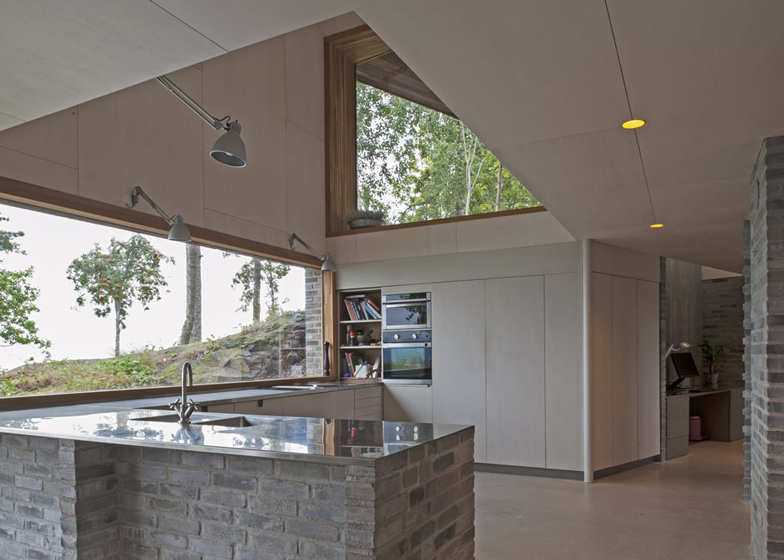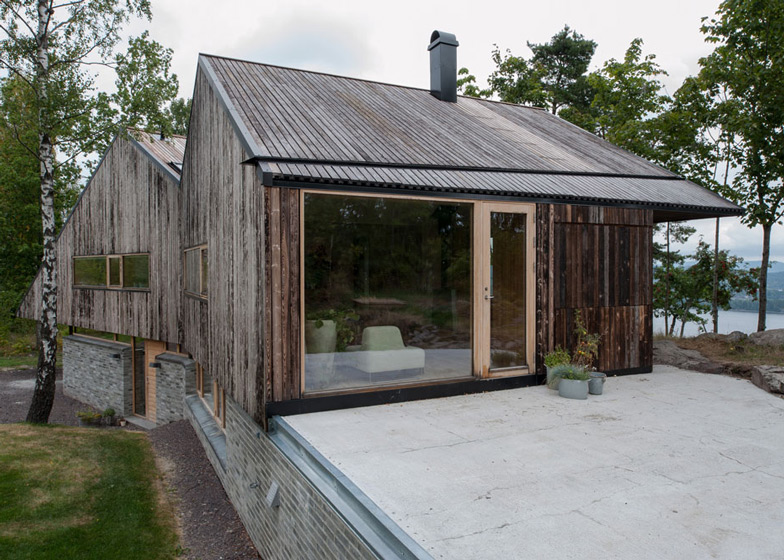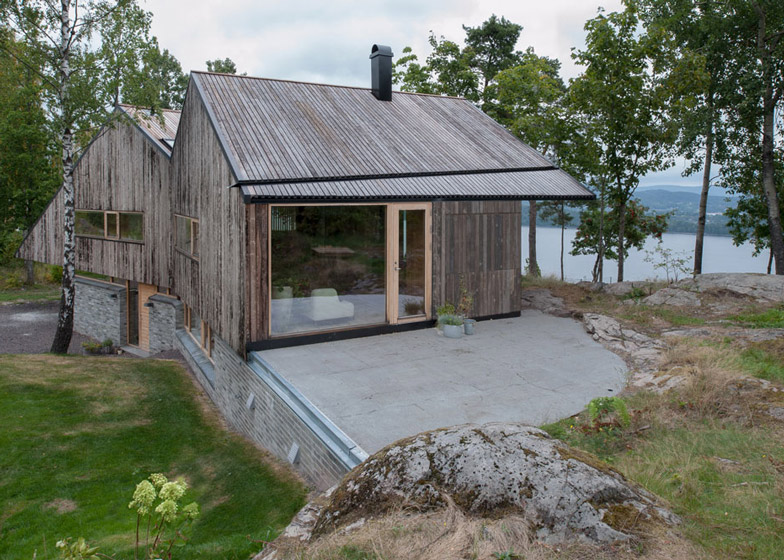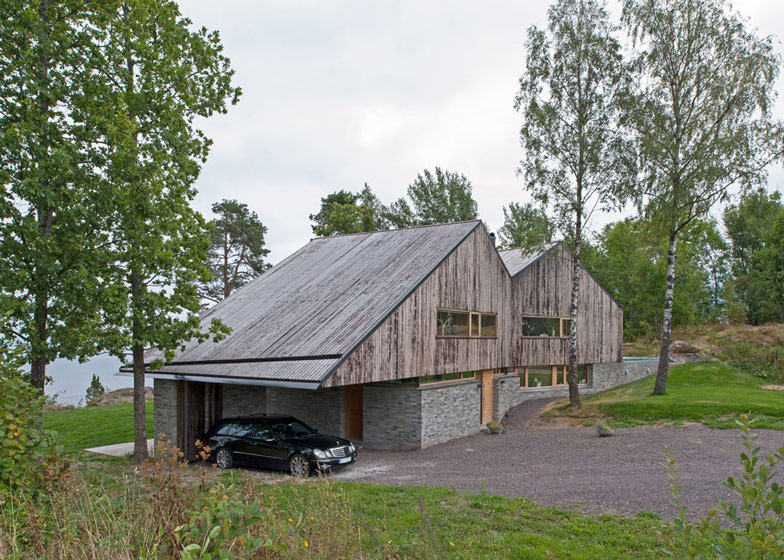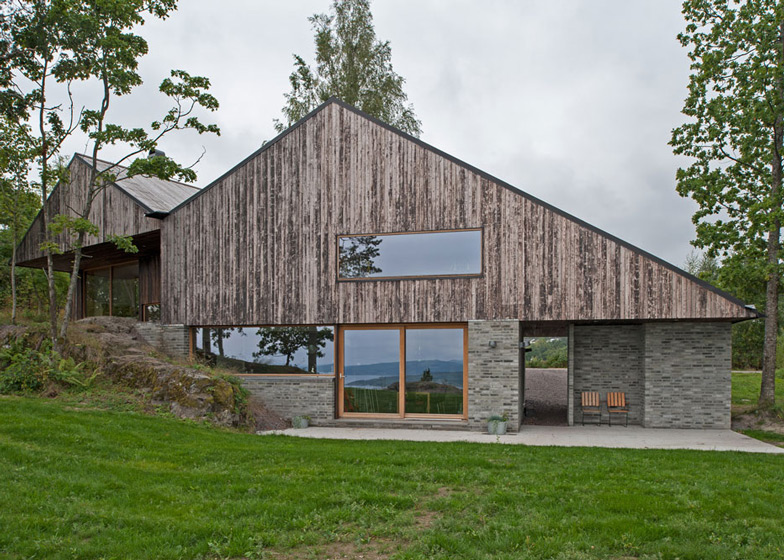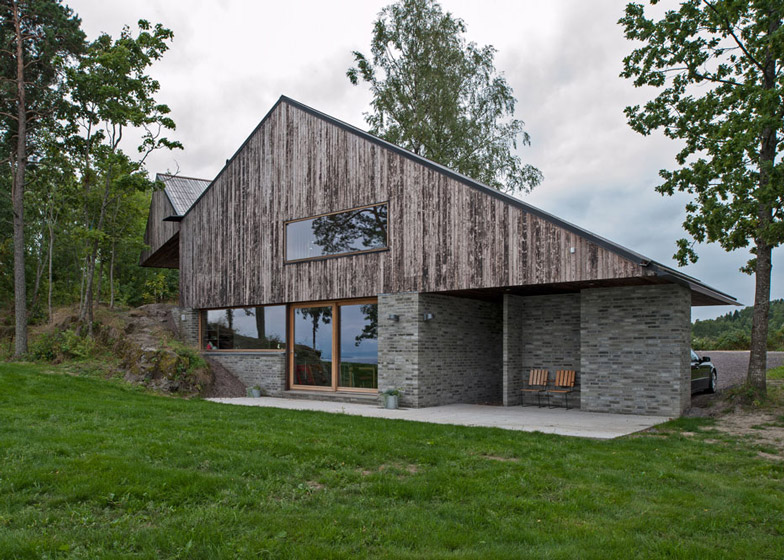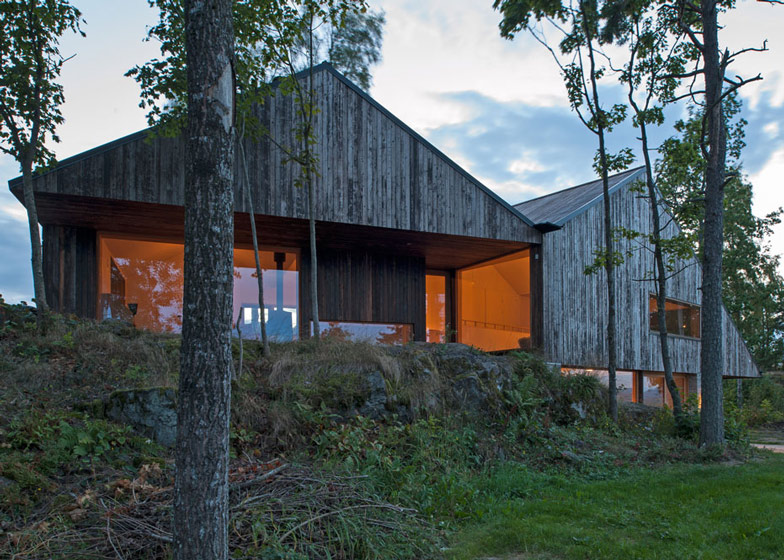The two parts of this house near Oslo by Schjelderup Trondahl Architects are joined at an angle, with their gabled roofs meeting to form a distorted M-shape (+ slideshow).
Oslo firm Schjelderup Trondahl Architects designed the family home for a site overlooking the city of Holmestrand and the adjacent fjords.
The house's two wings are angled at 22 degrees to one another, creating a concave facade facing the access road and opening up on the other side to provide different views of the landscape.
"The challenge in sites like this is usually to refine the views rather than exposing everything everywhere, switching between distant and close views, glimpses and different sources of light and reflections," said the architects.
"Because of its complex form, cantilevered roofs, shifting facades and intersecting spaces, the house offers a spacial experience, a number of different views and randomly occurring reflections" they added.
The topography of the plot influenced the layout of the plan, which rises over a rocky outcrop and is nestled among existing trees.
The exterior of the ground floor is clad in brick and juxtaposed against the angular wooden box above, which cantilevers outwards to create sheltered porches and balconies.
Heartwood fir boards that cover the walls of the upper storey, as well as the roofs, are burnt and brushed in a process that protects them and will cause them to fade to a pale, silvery grey.
Spaces inside the home correspond to the complex angles of the exterior, with gabled ceilings in several of the first floor rooms, and a kink in the wall of the staircase clearly showing where the two wings of the house are joined.
The same brick used for the exterior of the ground floor covers some of the internal walls and forms a breakfast bar in the kitchen.
Walls and ceilings are covered in oiled poplar plywood, with white ash floor boards helping to maintain a bright and airy feeling inside the house.
Windows with chunky oak frames look out on the surrounding forest and across the fjord, while internal glass partitions provide views between some of the rooms.
Photography is by Jonas Adolfsen.
Here's some more information from the architects:
House Off/Ramberg – Holmestrand, Norway
Location
The city of Holmestrand is divided by a characteristic 120m vertical cliff, separating urban functions at the lower sea side from the housing estate on the upper level. Holmestrand is under constant transformation being a part of suburban Oslo and important for commuting and regional business. The Norwegian State Railways are currently building new tracks to the city with a new elevator shaft between upper and lower levels, thereby improving the connection further.
The single family house is situated on the edge of this prominent cliff edge overlooking Holmestrand and the fjords. The site has a spectacular 180 degree view towards the sea to the east and an open cultural landscape to the west. The challenge in sites like this is usually to refine the views rather than exposing everything everywhere, switching between distant and close views, glimpses and different sources of light and reflections.
Adapting to site
The house was planned merged with the terrain with the least possible intervention, based on extensive analysis of program, strict municipal regulation, landscape characteristics, views (both distant and close) and the vegetation/location. The site was measured down to 10cm accuracy allowing untouched terrain and existing trees to be planned right up next to the building.
The volume has a distinct duality with its compact, west façade facing towards the access road and the more extroverted and fragmented façade opening up to the great eastern view. The two main wings are bent 22 degrees relative to each other to adapt to the terrain and capture different views. Because of its complex form, cantilevered roofs, shifting facades and intersecting spaces the house offers a spacial experience, a number of different views and randomly occurring reflections.
House specifics
The ground floor body is made from site-typical colored tile stone diaphragm walls (two sided) and light concrete floors. The upper part of the house is a wooden box climbing and cantilevering over the heavy base. The walls, external ceilings and roofs are covered with burnt and brushed heartwood fir to make them maintenancefree for generations - a Norwegian style of the Japanese method Shou-Sugi-Ban. The patination process will continue. With time the soft parts of the surface will stay burnt and the harder winter grain will have become silvery gray resulting in a rough but refined expression.
The interior wooden walls and ceilings are clad with white oiled poplar plywood boards and white ash floor boards are used introducing a light softness to the interior. The internal geometry represents necessary constructions for the cantilevered roofs in addition to defining spaces. Integrated furnishings are made on site from white fiber cement boards or bronze colored Glimmerdesign lacquered MDF depending on their placement and function. All windows and doors are made from massive oak.
Location: Holmestrand, Norway
Building type: Single family house
Constructor: Larsen Bygg AS/Lars Arnulf Finden
Consultant: Frederiksen AS / Håkon Bergsrud
Size: 273m2 (gross)
Architect: Schjelderup Trondahl Architects AS
Primary Architects: Stian Schjelderup, Øystein Trondahl, Katrine Skavlan

